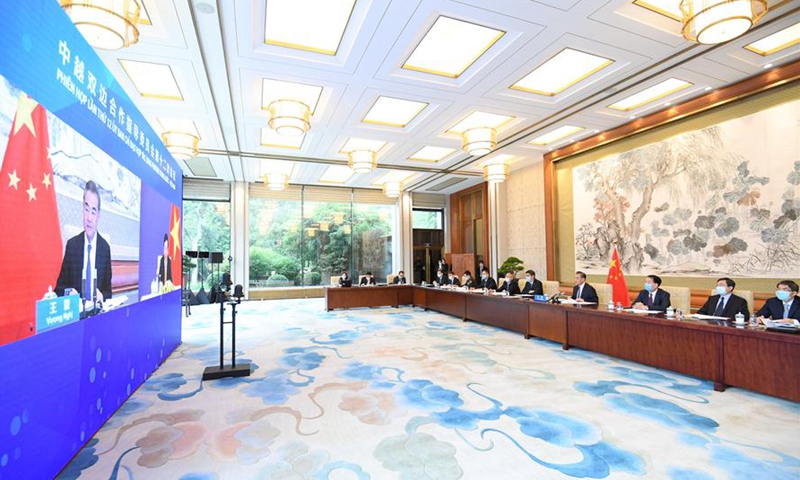Chinese top diplomat makes rare criticism of US in meeting with Vietnamese officials
By Zhang Hui Source: Global Times Published: 2020/7/22 16:43:23

Chinese State Councilor and Foreign Minister Wang Yi co-chair the 12th meeting of the China-Vietnam Steering Committee for Bilateral Cooperation with Vietnamese Deputy Prime Minister and Foreign Minister Pham Binh Minh via video link in Beijing, capital of China, July 21, 2020. (Xinhua/Shen Hong)
US' seeming support for Vietnam, the only South China Sea regional country that maintains close military and security ties with the US, on the South China Sea issue comes from its strategic need to disrupt regional development and stability and contain China, and Vietnam will lose more than it gains if it falls into the US trap, analysts said.
The meeting came after the Asian Infrastructure Investment Bank (AIIB) approved a $100 million loan to a commercial bank in Vietnam to help sustain business activities disrupted by the COVID-19 pandemic, but some media claimed that China used it to coerce Vietnam over South China Sea disputes.
Chinese analysts called such claims are "pure conspiracy," as the loan came under the Belt and Road Initiative framework, which is unrelated to the disputes.
Talking about the South China Sea issue, Wang said that due to geostrategic needs, the US has fanned flames everywhere to stir up tensions and turmoil in the region.
During the 12th Meeting of the China-Vietnam Steering Committee for Bilateral Cooperation, Wang also called on the two sides, together with other ASEAN countries, to push forward consultations on the Code of Conduct, and not to give any opportunity for interference and destruction by external forces.
Some extremist forces in the US have recently provoked ideological disputes and even coerced countries to pick sides in an attempt to bring back the notorious McCarthy era. Their show will continue, but the world will see their malicious intent to create global confrontations, Wang said, noting that both China and Vietnam are socialist countries led by the Communist Party, and upholding the socialist system conforms with the common interests of the two countries.
This was the first time since 2006 that Wang has clearly mentioned the US at meetings of the China-Vietnam Steering Committee for Bilateral Cooperation, observers said.
Chen Xiangmiao, a research fellow at the Hainan Province-based National Institute for South China Sea Studies, told the Global Times on Wednesday that Wang's remarks came one week after the US alleged that most of Beijing's claims in the sea are "completely unlawful," including those over the waters off Vietnam, sending a strong signal to Vietnam that it should be rational and on high alert over US' malicious intentions.
"The US has intensified its criticism of China's socialist system and the leadership of the Communist Party of China recently, and Vietnam should know that if the US can target China, it will target Vietnam," Chen said.
The US has not been a real helper of Vietnam, as it has been working to stir up democratic reforms and incite a "Color Revolution" in the country. If Vietnam leans toward the US, it would face the risk of an unstable domestic political system, Chen said.
Analysts believed the US will stir up more troubles in the South China Sea as part of its strategy to confront China, and China will not pick the fight first but has fully prepared for any escalated confrontations with the US.
In response to US' possible sanctions against Chinese officials over the South China Sea, Chen proposed that China issue reciprocal measures to further sanction anti-China senators such as Marco Rubio and institutions such as the Asia Maritime Transparency Initiative, which has been maliciously hyping up China's so-called military buildup in the South China Sea.
Posted in: DIPLOMACY